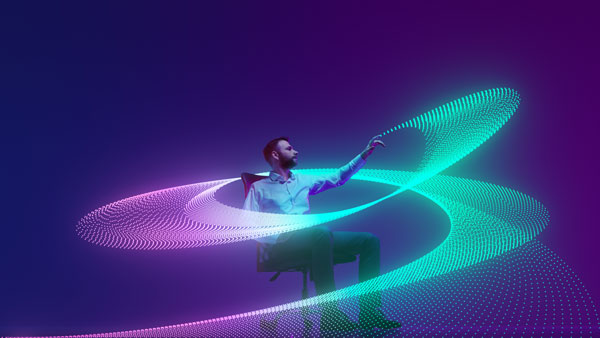in Creative
More Time to be Human
"Experience Alchemist" Shares Insights on AI

As AI reshapes the way we learn, work, and connect, Michael Deperro—Senior Coordinator of Faculty Development and Professionalism at Case Western Reserve University School of Medicine—offers a grounded, human-first perspective. With a background in hospitality, live events, and experience design, Deperro champions technology not as a replacement for people, but as a tool to elevate them. In this conversation, he explores the ethical, cultural, and leadership challenges AI presents—and the powerful opportunities it offers when used with intention.
You've drawn a powerful comparison between the Gutenberg Press and AI. What's the parallel?
The Gutenberg Press was a revolutionary tool, but it was useless until people learned how to read. AI is similar—it's not the tool itself, but the infrastructure and education around its use that will determine its value. We need to teach people how to use AI effectively, ethically, and with purpose. Otherwise, we're just generating noise.
You're known as an "experience alchemist." What does that mean in an AI-driven world?
I come from the hospitality world, where experiences—not events—create transformation. AI can absolutely elevate that, but it's how we use the technology that matters. Once everyone has the same "superpower," what differentiates us is our humanity. You can't automate empathy. You can't replace presence. AI should give us more time to be human, not less.
What excites you most about AI right now?
Agentic AI, tools that act on your behalf without constant input, has huge potential. But it comes with real responsibility. As with any tech leap, there's risk and reward. What excites me is the chance to help organizations adopt these tools in ways that don't just boost efficiency, but elevate people.
What's the danger if we don't use AI with intention?
We risk building a culture of automation that ignores the human cost. You might double productivity, but if your people were already at their limits, now you're burning them out. Technology should reduce the how so we can focus on the why. It's not about replacing people—it's about getting more of what makes them valuable.
You now serve medical faculty. How is AI helping in that setting?
These are clinicians and educators—healers and teachers—often working under immense emotional and physical pressure. AI helps bring in knowledge, experts, and learning that would otherwise be inaccessible. It's not always about choosing between in-person or online—it's often between online or nothing. So we use the tools intentionally to support, not replace, the human element.
How should higher ed leadership respond to the rise of AI?
First, embrace it—AI isn't going away. Provide tools and training so your teams can use it wisely. But also invest in your culture. Don't just focus on the bottom line—ask what kind of organization you want to be. Help your teams use AI to do the dishes so they can create the art.
Final advice to those leading change?
Create space for conversations. Model curiosity. Build a culture that values both progress and people. As one of my mentors says, if something matters, make time for it. And in this moment, nothing matters more than balancing innovation with humanity.

